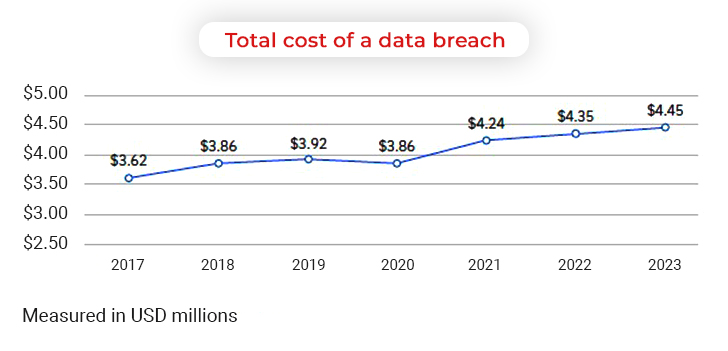The digital world generates a large amount of data per day. This can be both helpful and challenging for decision-makers. On one hand, it can reveal important patterns and insights into customer behavior, market trends, and ways to improve operations. On the other hand, leaders like CTOs and CIOs may feel overwhelmed by the sheer volume and complexity of the data they must deal with.
As the amount of data continues to grow, decision-makers are facing the challenge of accumulating data, unlocking its potential, and converting it into actionable insights to propel their organizations forward.

In fact, many business leaders are still struggling to leverage the potential of data and 87% of them are suffering from decision distress owing to data deluge. This is where Dynamics 365 emerges as a game-changer, a transformative solution designed to catalyze data-driven decision-making and supercharge business success. Let’s dig deeper to understand how it empowers CIOs, CTOs, and other decision-makers in making impactful and informed business decisions.
How Dynamics 365 Enables Data-Driven Decision-Making
1. Provides a Holistic View of Business Operations
Dynamics 365 (or D365) emerges as a beacon of clarity amidst the chaos of data overload. This comprehensive suite of cloud-based applications acts as a centralized hub that not only integrates data seamlessly across various business functions including finance, sales, marketing, and customer service but also allows decision-makers to see the bigger picture.
In fact, recent studies indicate that organizations using Dynamics 365 witnessed a substantial improvement in their decision-making due to enhanced visibility and insights into the organization’s operations. No wonder it has doubled the growth rate of Microsoft.
2. Allows You to Harness the Power of Built-in Analytics and BI Capabilities
In today’s data-driven landscape, companies need personalized insights catering to their unique challenges. It goes beyond data aggregation from disparate sources and thrives on its built-in data analytics and BI capabilities that transform raw and unstructured data into actionable insights. This indicates that enterprises using D365 can significantly improve their ability to make impactful decisions that positively impact the results.
How to Successfully Implement Dynamics 365
3. Helps You Stay Ahead with Predictive Analytics
The ability to accurately predict customer behavior and market trends is invaluable for business leaders. Its predictive analytics capabilities empower decision-makers to make powerful decisions. By analyzing past data, identifying trends, and predicting outcomes, this robust platform empowers decision-makers to look into the future. Furthermore, companies using the predictive analytics capabilities of Dynamics 365 reported a significant improvement in operational efficiency and customer retention.
4. Improves Communication and Collaboration
Effective communication and collaboration are paramount in the era of remote work culture. It fosters collaboration by breaking down silos between dispersed teams and provides a unified platform for easy data sharing and smooth communication. This has translated into tangible business benefits, for instance, a survey report reveal that organizations leveraging the potential of collaboration tools like D365, reported an uptick of 20-25% in workforce productivity.
5. Strengthens Security and Compliance
Data-driven excellence is a double-edged sword since it opens new avenues for growth and success whilst exposing vulnerabilities. In an era of cyber threats and data breaches, security and compliance are paramount. In fact, 98% of organizations see cybersecurity as a strategic priority. The good news is that D365 takes this challenge head-on and addresses security concerns through robust security measures and compliance features. According to the latest report by the Ponemon Institute, the average cost of a data breach hit a record high of 4.5 million USD, an uptick of 12% from 2020.

6. Drives ROI: Dynamics 365 as a Strategic Investment
Every investment decision boils down to the ROI question, and Dynamics 365 doesn’t disappoint decision-makers. It not just offers data-driven insights, but it also drives significant ROI. For every dollar spent on D365, companies receive an average return of 16.97 USD, a staggering ROI that decision-makers can’t afford to overlook.
Mitigating the Retail Industry Challenges with Dynamics 365
Best Practices for Implementing Dynamics 365 for Enhanced Decision-Making
I. Carefully Plan the Implementation
- Conduct an in-depth audit of your IT infrastructure and business needs
- Decide on the best implementation options (on-premises or cloud)
II. Select the Right Implementation Partner
- Choose a Microsoft Certified Dynamics 365 partner with proven experience
- Ensure they understand your business needs and provide guidance throughout the process
- Verify their track record of successful deployments and effective communication
III. Assess Existing Tools and Functionalities
- Identify gaps that can be addressed by integrating Dynamics 365 with your current systems
- Assess existing tools, processes, and applications to enable a smooth transition
- Gain insights from existing users to prioritize improvements
IV. Analyze Business Requirements
- Understand the areas or processes that can benefit most from Dynamics 365 implementation
- Prioritize implementation efforts based on specific workflows and business functions
- Ensure Dynamics 365 aligns with your organization’s unique requirements
V. Utilize Resources Effectively
- Properly utilize budget, people, time, and technology resources throughout implementation
- Ensure efficient operation of Dynamics 365 by optimizing technology assets
- Complete the project successfully by properly utilizing all resources
VI. Ensure Seamless User Adoption
- Engage end users throughout the implementation process to collect inputs and feedback
- Provide training and support to help users fully adapt to Dynamics 365 functionalities
- Continuously improve the system based on user acceptance testing and feedback
VII. Maintain Proper Collaboration and Communication
- Ensure effective collaboration and communication among teams
- Maintain transparency and manage expectations to avoid surprises
- Follow a sprint-driven approach with gradual, early changes to break down fears of change
Summing Up
Making decisions based on data is crucial in today’s changing business world. D365 provides decision-makers with the tools they need to understand data better. It also helps them predict trends, get personalized information, and have a clear view of how the business is running. If you also want to transform raw data into a strategic asset that propels your organization to new heights of success, consider seeking Dynamics 365 consulting from a reliable tech partner. By seeking consultation from a D365 expert, you get insights from your data, leading to right data-driven decisions and unparalleled success.
Case in Focus
The client is a leading global manufacturing firm that operates in a competitive landscape. For quite some time, the client was facing challenges in streamlining the supply chain, optimizing production, and enhancing customer experiences. Recognizing the need for data-driven insights, the client decided to transform their decision-making process using D365. The client partnered with Damco Solutions to break down the data silos and overcome the lack of integration challenge. As a result, the client was able to enhance customer experience by over 50% and anticipate market trends with over 95% accuracy.





